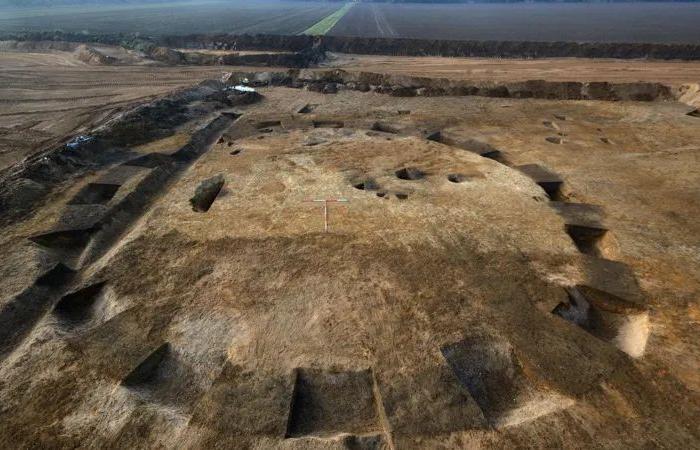Archaeological excavations play a crucial role in understanding the evolution of human societies through the ages. Recently, a team of archaeologists from the Cambridge Archaeological Unit, in collaboration with the company Cemex UK, undertook excavations at West Deeping, Lincolnshire, United Kingdom. This site, studied since the 1990s, has revealed traces of human occupation spanning 6,000 years, from the Neolithic and Bronze Age periods through to Roman and medieval times.
These exceptional discoveries shed new light on the agricultural practices and social structures of these ancient communities, while offering today’s inhabitants a rare opportunity to rediscover their heritage. This series of excavations reveals sophisticated objects and remains of buildings, testifying to the ingenuity of the populations who inhabited the region for millennia.
An extended chronology of discoveries
Archaeological research at West Deeping began after aerial surveys and geophysical studies revealed clues to the presence of structures buried underground. These initial discoveries led to extensive excavation of the site. And it turned out to be extremely rich in remains covering a period of 6,000 years. Among the finds, quarry pits, burials containing military metal ornaments, as well as large posts which bear witness to important constructions dating from the Iron Age.
These findings indicate continued human activity at the site through several historical eras. Each period brought its share of cultural and architectural particularities. For example, a Roman statue representing Mars, the god of war, and a burial mound dating from the Bronze Age complete this impressive historical picture.
Experts have discovered the foundations of a Roman barn at the site. © Cambridge Archaeological Unit
Hannah Barrett, project officer at the Cambridge Archaeological Unit, points out BBCthe importance of this chronological diversity. She explains that this site is not limited to a single historical period, but represents all major eras, from the Neolithic to the Saxon era of the 6th century. The sophisticated tools and pottery unearthed reflect the know-how of ancient local populations.
The latter, despite sometimes harsh living conditions, have developed advanced craft techniques. Barrett adds that it is the largest collection of pottery ever discovered in the East of England and the Midlands. This reinforces the importance of these discoveries for understanding the history of the United Kingdom. These objects reveal not only aspects of daily life, but also the commercial relationships and social practices of ancient civilizations.
A unique link to local history in West Deeping
The archaeological dig at West Deeping is of particular importance to the region. Indeed, local history is often less known than in other parts of the United Kingdom. Located in a rural area, the region has not until now constituted a hotspot for historical studies. Yet the artifacts unearthed, such as flint tools and remains of wild animals such as wild boar, reveal a daily life rich in activity.
A life marked by hunting and the management of natural resources. They also found environmental samples of seeds and grains. These finds show that, despite the apparent isolation of the site, the early inhabitants of West Deeping possessed advanced skills and lived in a well-organized environment. The excavation thus sheds light on a little-known part of British history, highlighting hitherto invisible practices and ways of life.
For current residents of West Deeping, these discoveries offer a rare opportunity to reconnect with their past. As Maggie Ashcroft pointed out, this excavation not only allows us to preserve this unique heritage, but also to share it with the public before it is archived. This gives locals and visitors the opportunity to understand how their ancestors lived, worked and interacted with their environment. This helps to reinforce the feeling of belonging to an ancient history. This spotlighting of the past also allows the region to reassess its historical importance. It thus enriches the local collective memory.
A public exhibition to share these treasures, a precious heritage to preserve
The public exhibition on ‘West Deeping Archaeological Heritage Day’ was a highlight for the local community, who will be able to see objects never before displayed. This type of event is rare in the field of archeology, as artifacts are often quickly transferred to museums or stored for later research. By making these discoveries accessible to the general public, the West Deeping Heritage Group offers residents a unique chance to contemplate the physical evidence of their past. This exhibition also highlights the evolution of agricultural and social practices in the region over thousands of years, with objects that illustrate the daily lives of its ancient inhabitants.
The lecture given by Hannah Barrett, entitled “6,000 years of life and death at West Deeping”, completes this educational approach by providing scientific and historical context to the discoveries.
As gravel mining at West Deeping Quarry draws to a close, these archaeological discoveries provide a valuable legacy for the region, but also for the UK. They not only provide a better understanding of the different periods of British history, but also provide a link between the past and the present for the residents of West Deeping.
Thanks to the commitment of the team of archaeologists and the support of organizations such as Cemex UK, the rich history of Lincolnshire will be preserved and shared with future generations. These excavations illustrate the importance of archeology in understanding our past, while highlighting the essential role of local communities in the valorization of this invaluable heritage.
Source : BBC






